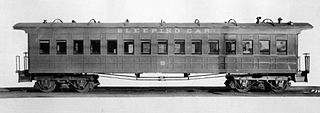
The sleeping car or sleeper is a railway passenger car that can accommodate all passengers in beds of one kind or another, for the purpose of sleeping. George Pullman was the American innovator of the sleeper car.
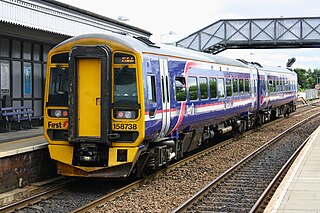
First ScotRail was a train operating company in Scotland owned by FirstGroup. It operated the ScotRail franchise between October 2004 and March 2015.

Inverness railway station serves the Scottish city of Inverness. It is the terminus of the Highland Main Line, the Aberdeen–Inverness line, the Kyle of Lochalsh line and the Far North Line.

Arrochar and Tarbet railway station is a railway station on the West Highland Line in Scotland. It stands between the villages of Arrochar and Tarbet. It is sited 19 miles 45 chains (31.5 km) from Craigendoran Junction, near Helensburgh, between Ardlui and Garelochhead. ScotRail manage the station and operate most services, with others provided by Caledonian Sleeper.

Transport in Scotland is facilitated by road, rail, air and water networks. The Scottish Government and Scottish Parliament has control over most elements of transport policy within Scotland, with the Cabinet Secretary for Transport holding portfolio responsibility within the Scottish Government. Transport Scotland is the Executive Agency responsible for the Scottish transport network.

Westerton railway station is a railway station that serves the Westerton district in the town of Bearsden, Scotland. The station is managed and served by ScotRail as part of the Strathclyde Partnership for Transport network. It is located on the Argyle and North Clyde lines, between Drumchapel to the west, Bearsden to the north, and Anniesland and Maryhill to the south-east. It is 6 miles 10 chains (9.9 km) west of Glasgow Queen Street, measured via Maryhill.

Ardlui railway station is a rural railway station, serving Ardlui at the north end of Loch Lomond, in Scotland. The station is located on the West Highland Line, sited 27 miles 43 chains (44.3 km) from Craigendoran Junction, near Helensburgh, between Crianlarich and Arrochar and Tarbet. ScotRail manage the station and operate most services, others provided by Caledonian Sleeper.

Caledonian Sleeper is the collective name for overnight sleeper train services between London and Scotland, in the United Kingdom. It is one of only two currently operating sleeper services on the railway in the United Kingdom – the other being the Night Riviera, which runs between London and Penzance.
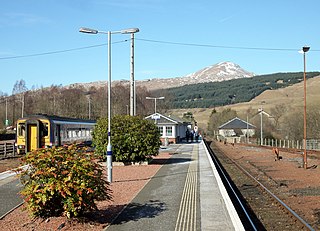
Crianlarich railway station is a railway station serving the village of Crianlarich in Scotland. It is located on the West Highland Line, sited 41 miles 25 chains (66.5 km) from Craigendoran Junction, near Helensburgh, with Ardlui to the south, and Tyndrum Lower and Upper Tyndrum to the north west, on the routes to Oban and Mallaig respectively, which diverge immediately north of the station. ScotRail, who manage the station, operate most services.

Bridge of Orchy railway station is a railway station in the village of Bridge of Orchy in the west of Scotland. The station is on the West Highland Line, between Rannoch and Upper Tyndrum, 48 miles 68 chains (78.6 km) from Craigendoran Junction, near Helensburgh. ScotRail manage the station and operate most services, with others provided by Caledonian Sleeper.
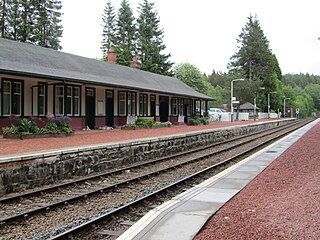
Tulloch railway station is a rural railway station in the remote Tulloch area of the Highland region of Scotland. This station is on the West Highland Line, between Corrour and Roy Bridge, sited 81 miles 59 chains (131.5 km) from Craigendoran Junction, near Helensburgh.

Roy Bridge railway station is a railway station serving the village of Roybridge in the Highland region of Scotland. This station is on the West Highland Line, between Tulloch and Spean Bridge, sited 87 miles 35 chains (140.7 km) from Craigendoran Junction, near Helensburgh. ScotRail manage the station and operate most services, along with Caledonian Sleeper.

Spean Bridge railway station is a railway station serving the village of Spean Bridge in the Highland region of Scotland. This station is on the West Highland Line, between Roy Bridge and Fort William, sited 90 miles 56 chains (146 km) from Craigendoran Junction, near Helensburgh. ScotRail manage the station and operate most services, along with Caledonian Sleeper.

Fort William railway station serves the town of Fort William, in the Highland region of Scotland. It is on the West Highland line, between Spean Bridge and Banavie, measured 99 miles 37 chains (160.1 km) from Craigendoran Junction, at the southern end of the line near Helensburgh. The station is managed by ScotRail, who operate most services from the station; Caledonian Sleeper and The Jacobite, an excursion operated by West Coast Railways, also use the station.

Garelochhead railway station is a railway station serving the village of Garelochhead, on the Gare Loch, in Scotland. This station is on the West Highland Line and is a boundary station for SPT. It is sited 8 miles 76 chains (14.4 km) from Craigendoran Junction, near Helensburgh, between Arrochar and Tarbet and Helensburgh Upper. ScotRail manage the station and operate most services, with others provided by Caledonian Sleeper.

Carluke railway station is a railway station on the West Coast Main Line (WCML) that serves the town of Carluke, South Lanarkshire, Scotland. The station is managed by ScotRail and is predominantly served by Argyle Line commuter trains running between Lanark and Glasgow Central. The station lies at the western edge of the town, and enjoys panoramic views of the Clyde Valley and beyond to the hills of Lanarkshire and Ayrshire.
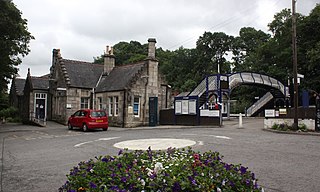
Pitlochry railway station is a railway station serving the town of Pitlochry in Perth and Kinross, Scotland. It is managed by ScotRail and is located on the Highland main line, 28 miles 21 chains (45.5 km) from Perth, between Dunkeld & Birnham and Blair Atholl.

Carstairs railway station serves the village of Carstairs in South Lanarkshire, Scotland and is a major junction station on the West Coast Main Line (WCML), situated close to the point at which the lines from London Euston and Edinburgh to Glasgow Central merge. Constructed originally by the Caledonian Railway, the station is managed today by ScotRail who also operate most services which serve the station; it is also served by one TransPennine Express service per day between Manchester Airport and Glasgow Central and one Caledonian Sleeper service each way per day between Glasgow Central and London Euston. All other services by TransPennine Express and services operated by Avanti West Coast, CrossCountry and London North Eastern Railway pass the station, but do not stop.

The Glasgow–Edinburgh via Carstairs line is a main railway route which connects the Scottish cities of Glasgow and Edinburgh, by means of their respective sections of the West Coast Main Line (WCML).
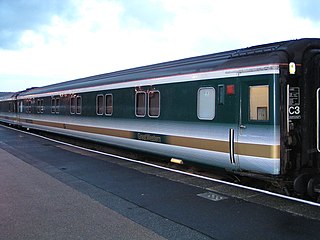
A Sleeper Either class (SLE) and Sleeper Either class with Pantry (SLEP) are a type of railway sleeping car used in Great Britain. Some units were later modified for better wheelchair access as Sleeper Either class Disabled (SLED). A smaller number reused in Denmark were classified as WLABr.























